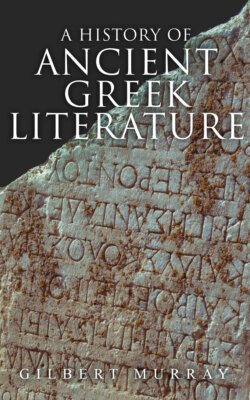Читать книгу A History of Ancient Greek Literature - Gilbert Murray - Страница 5
На сайте Литреса книга снята с продажи.
INTRODUCTORY
ОглавлениеIN attempting to understand the scope and development of Greek literature, our greatest difficulty comes from the fragmentary and one-sided nature of our tradition. There has perhaps never been any society in history so near to the highest side of our own as the Athens of Euripides and Plato. The spiritual vividness and religious freedom of these men, the genuineness of their culture and humanity, the reasoned daring of their social and political ideals, appeal to us almost more intimately than does our own eighteenth century. But between us and them there has passed age upon age of men who saw differently, who sought in the books that they read other things than truth and imaginative beauty, or who did not care to read books at all. Of the literature produced by the Greeks in the fifth century B.C., we possess about a twentieth part; of that produced in the seventh, sixth, fourth, and third, not nearly so large a proportion. All that has reached us has passed a severe and far from discriminating ordeal. It has secured its life by never going out of fashion for long at a time; by appealing steadily to the book-trade throughout a number of successive epochs of taste -- fourth-century Greece, pre-Christian Alexandria, Augustan Rome, the great Hellenic revival of the Antonines, the narrower Attic revival of the later sophists.
After the death of Julian and Libanius, one is tempted to think that nobody was really interested in literature any more; but certain books had long been conventionally established in the schools as 'classics,' and these continued to be read, in ever-dwindling numbers, till the fall of Constantinople and the Renaissance. The eccentricities of the tradition would form material for a large volume. As in Latin it has zealously preserved Vergil and Avianus the fabulist, so in Greek it has multiplied the MSS. of Homer and of Apollonius the Kitian On Sprains. As in Latin it practically lost Lucretius save for the accident of a single MS., and entirely lost Calvus, so in Greek it came near to losing Æschylus, and preserved the most beautiful of the Homeric hymns only by inadvertence. In general, it cared for nothing that was not either useful in daily life, like treatises on mechanics and medicine, or else suitable for reading in schools. Such writers as Sappho, Epicharmus, Democritus, Menander, Chrysippus, have left only a few disjointed fragments to show us what precious books were allowed to die through the mere nervelessness of Byzantium. But Rome and Alexandria in their vigour had already done some intentional sifting. They liked order and style; they did not care to copy out the more tumultuous writers. The mystics and ascetics, the more uncompromising philosophers, the ardent democrats and the enthusiasts generally, have been for the most part suppressed. We must remember that they existed, and try from the remains to understand them.
